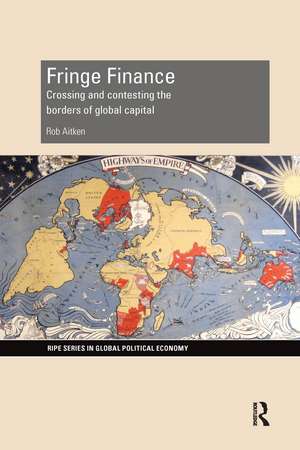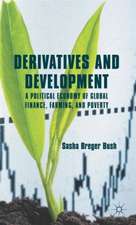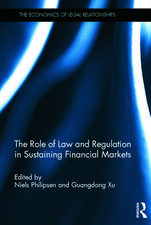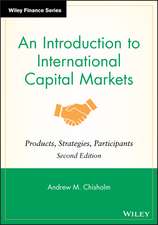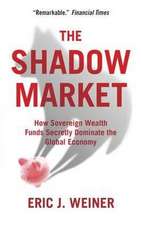Fringe Finance: Crossing and Contesting the Borders of Global Capital: RIPE Series in Global Political Economy
Autor Rob Aitkenen Limba Engleză Paperback – 30 iun 2020
Alongside and as part of these broader spasms, however, has been another key trend—the intensifying reach of global financial markets into and among those populations which live at its very edges. There are increasing, and increasingly profitable, experiments which are explicitly targeted to those without regular access to full or formalized financial practices. This book places the practices of fringe finance in critical context by situating them within a larger set of discussions in the field. Most importantly, this book is part of a much broader attempt in IPE to rethread the study of finance to questions of cultural and social theory in a meaningful manner. Finance is increasingly subjected to innovative forms of social inquiry influenced by a range of diverse methods including governmentality, actor-network theory and cultural economy. By drawing on several strands of social theory, this book contributes to this broader movement in IPE and helps open more space for the continuation of these interdisciplinary conversations.
This work will be of great interest to students and scholars of IPE, development studies and economic sociology.
| Toate formatele și edițiile | Preț | Express |
|---|---|---|
| Paperback (1) | 389.66 lei 6-8 săpt. | |
| Taylor & Francis – 30 iun 2020 | 389.66 lei 6-8 săpt. | |
| Hardback (1) | 1054.71 lei 6-8 săpt. | |
| Taylor & Francis – 19 feb 2015 | 1054.71 lei 6-8 săpt. |
Din seria RIPE Series in Global Political Economy
-
 Preț: 310.75 lei
Preț: 310.75 lei -
 Preț: 280.02 lei
Preț: 280.02 lei -
 Preț: 281.27 lei
Preț: 281.27 lei -
 Preț: 310.01 lei
Preț: 310.01 lei -
 Preț: 381.57 lei
Preț: 381.57 lei -
 Preț: 288.80 lei
Preț: 288.80 lei - 26%
 Preț: 820.21 lei
Preț: 820.21 lei - 18%
 Preț: 700.75 lei
Preț: 700.75 lei -
 Preț: 386.55 lei
Preț: 386.55 lei -
 Preț: 470.90 lei
Preț: 470.90 lei - 18%
 Preț: 999.46 lei
Preț: 999.46 lei - 18%
 Preț: 1054.97 lei
Preț: 1054.97 lei - 18%
 Preț: 1057.40 lei
Preț: 1057.40 lei - 18%
 Preț: 1055.60 lei
Preț: 1055.60 lei - 18%
 Preț: 1054.71 lei
Preț: 1054.71 lei -
 Preț: 362.26 lei
Preț: 362.26 lei -
 Preț: 456.16 lei
Preț: 456.16 lei - 18%
 Preț: 1058.79 lei
Preț: 1058.79 lei - 18%
 Preț: 1057.89 lei
Preț: 1057.89 lei - 26%
 Preț: 822.54 lei
Preț: 822.54 lei -
 Preț: 278.75 lei
Preț: 278.75 lei - 18%
 Preț: 1056.47 lei
Preț: 1056.47 lei - 18%
 Preț: 1057.89 lei
Preț: 1057.89 lei - 18%
 Preț: 1054.89 lei
Preț: 1054.89 lei -
 Preț: 453.96 lei
Preț: 453.96 lei -
 Preț: 411.42 lei
Preț: 411.42 lei -
 Preț: 432.20 lei
Preț: 432.20 lei - 26%
 Preț: 821.53 lei
Preț: 821.53 lei -
 Preț: 487.86 lei
Preț: 487.86 lei -
 Preț: 353.94 lei
Preț: 353.94 lei - 26%
 Preț: 846.78 lei
Preț: 846.78 lei - 26%
 Preț: 766.24 lei
Preț: 766.24 lei - 18%
 Preț: 1058.43 lei
Preț: 1058.43 lei - 15%
 Preț: 427.78 lei
Preț: 427.78 lei - 18%
 Preț: 703.79 lei
Preț: 703.79 lei -
 Preț: 385.44 lei
Preț: 385.44 lei - 18%
 Preț: 700.31 lei
Preț: 700.31 lei - 18%
 Preț: 1004.20 lei
Preț: 1004.20 lei -
 Preț: 465.69 lei
Preț: 465.69 lei - 15%
 Preț: 672.40 lei
Preț: 672.40 lei - 18%
 Preț: 1016.52 lei
Preț: 1016.52 lei - 18%
 Preț: 1119.52 lei
Preț: 1119.52 lei -
 Preț: 485.07 lei
Preț: 485.07 lei
Preț: 389.66 lei
Nou
Puncte Express: 584
Preț estimativ în valută:
74.58€ • 77.56$ • 62.41£
74.58€ • 77.56$ • 62.41£
Carte tipărită la comandă
Livrare economică 15-29 martie
Preluare comenzi: 021 569.72.76
Specificații
ISBN-13: 9780367599645
ISBN-10: 0367599643
Pagini: 256
Dimensiuni: 156 x 234 x 18 mm
Greutate: 0.45 kg
Ediția:1
Editura: Taylor & Francis
Colecția Routledge
Seria RIPE Series in Global Political Economy
Locul publicării:Oxford, United Kingdom
ISBN-10: 0367599643
Pagini: 256
Dimensiuni: 156 x 234 x 18 mm
Greutate: 0.45 kg
Ediția:1
Editura: Taylor & Francis
Colecția Routledge
Seria RIPE Series in Global Political Economy
Locul publicării:Oxford, United Kingdom
Public țintă
Postgraduate and UndergraduateCuprins
Chapter 1. Finance at its Centre and its Edges, Part 1—Sites of Conversion Chapter 2. Mapping the Logics of Expansion: The Globalization of Payday Lending, Chapter 3. The Financialization of Micro-Credit, Chapter 4. Bodies at/of Risk: Micro-Insurance and the Vulnerable Life Course, Part 2—Fringe Finance as a Social Practice, Chapter 5. Making Regular: Fringe Lending as a Formal Practice, Chapter 6. From Inclusion to Adverse Incorporations, Chapter 7. Economies of Social Practice: Creating Alternative Circuits of Financial Incorporation
Descriere
This book places the practices of fringe finance in critical context by situating them within a larger set of discussions in the field.
This work will be of great interest to students and scholars of IPE, development studies and economic sociology.
This work will be of great interest to students and scholars of IPE, development studies and economic sociology.
